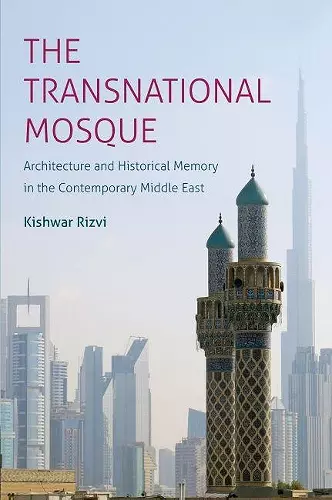The Transnational Mosque
Architecture and Historical Memory in the Contemporary Middle East
Format:Paperback
Publisher:The University of North Carolina Press
Published:28th Feb '20
Currently unavailable, our supplier has not provided us a restock date

Kishwar Rizvi, drawing on the multifaceted history of the Middle East, offers a richly illustrated analysis of the role of transnational mosques in the construction of contemporary Muslim identity. As Rizvi explains, transnational mosques are structures built through the support of both government sponsorship, whether in the home country or abroad, and diverse transnational networks. By concentrating on mosques--especially those built at the turn of the twenty-first century--as the epitome of Islamic architecture, Rizvi elucidates their significance as sites for both the validation of religious praxis and the construction of national and religious ideologies.
Rizvi delineates the transnational religious, political, economic, and architectural networks supporting mosques in Saudi Arabia, Iran, Turkey, and the United Arab Emirates, as well as in countries within their spheres of influence, such as Pakistan, Syria, and Turkmenistan. She discerns how the buildings feature architectural designs that traverse geographic and temporal distances, gesturing to far-flung places and times for inspiration. Digging deeper, however, Rizvi reveals significant diversity among the mosques--whether in a Wahabi-Sunni kingdom, a Shi&8219;i theocratic government, or a republic balancing secularism and moderate Islam--that repudiates representations of Islam as a monolith. Mosques reveal alliances and contests for influence among multinational corporations, nations, and communities of belief, Rizvi shows, and her work demonstrates how the built environment is a critical resource for understanding culture and politics in the contemporary Middle East and the Islamic world.
Clearly written, finely illustrated, and wonderfully organized . . . will be of enormous value to anyone interested in how the state ideology in the Middle East is manifest in the built environment. Highly recommended." - Choice
"It goes without saying that this is a timely volume, not only because it looks at the mosque as a key site of cultural politics in a world where political tension over religious difference prevails but also because of its methodological framework exposing the fallacy of representing Islam as a monolith. Nevertheless, it would be a mistake to limit The Transnational Mosque to a study on Islamic rchitecture; the book provides invaluable insights on the politics of architecture." - Art Bulletin
"The Transnational Mosque represents an extremely timely return to the study of religious architecture as part of our contemporary cultural landscape. It provides a well-researched and articulate narration of architectural projects that exceed national borders, grounded in remarkably cogent summaries of local politics and histories." - Journal of the Society of Architectural Historians
ISBN: 9781469659121
Dimensions: unknown
Weight: 420g
296 pages